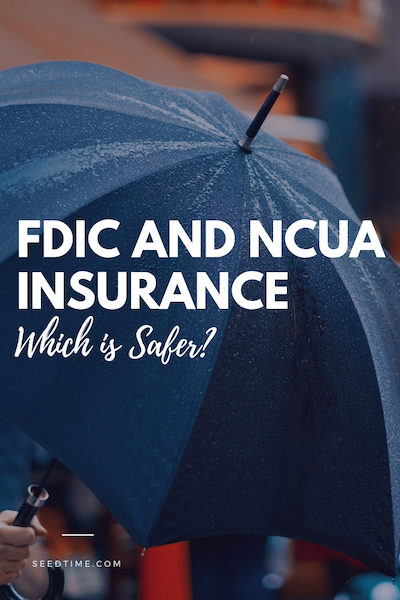
Whether you have an online bank or use the bank in your town, you share a common thread with almost every account holder in America. The bottom line is that you want your money to be safe.
Obviously safety and insurance are important when it comes to the money in your bank. That’s why FDIC insurance was created.
But what about credit unions, do they have the same protection as banks? It might surprise you, but credit unions don’t use FDIC. They use a form of insurance provided by the NCUA.
So what’s the difference? Is FDIC safer than NCUA? Let’s look into both and figure out the similarities and differences between FDIC and NCUA insurance.
What does FDIC Cover?
First off, FDIC stands for Federal Deposit Insurance Corporation, an independent government agency that was created under the Glass Steagall Act of 1933. The purpose of FDIC is to protect account holders in the event that a bank fails.
FDIC insurance will cover deposits within an insured bank. Just about every type of account is covered, including: checking, savings, money market deposit accounts, and certificates of deposit (CDs).
You as an account holder are insured up to $250,000 per institution under the FDIC insurance limits. Actually, FDIC insurance will extend to multiple ownership categories, so you may be able to have more than $250,000 insured at an institution if you qualify under these separate ownership categories.
The list of categories from FDIC website include:
- Single Accounts
- Certain Retirement Accounts
- Joint Accounts
- Revocable Trust Accounts
- Irrevocable Trust Accounts
- Employee Benefit Plan Accounts
- Corporation/Partnership/Unincorporated Association Accounts
- Government Accounts
What FDIC Does Not Protect
Just because your bank has FDIC insurance, it doesn’t mean that every account type will be covered. There are quite a few investment products that are not insured, which include: mutual funds, life insurance products, stocks, bonds, and annuities.
What Does NCUA Cover?
While credit unions aren’t covered by FDIC, it doesn’t mean they are any less safe. In fact, the NCUA (National Credit Union Administration) is also an independent federal agency that deals with insuring credit unions. Backed fully by the full faith and credit of the U.S. government, the NCUA provides protection through the NCUSIF (National Credit Union Share Insurance Fund).
Account holders at credit unions enjoy the same amount of protection ($250,000) as FDIC protected bank depositors. Established in 1970, the NCUSIF is funded solely by the credit unions and not U.S. tax payers, a characteristic that is shared by both NCUA and FDIC.
Like FDIC, the coverage of NCUSIF reaches to insure savings accounts, share draft (checking) accounts, certificates of deposit and money market accounts. Likewise, securities like mutual funds, stocks, bonds and insurance products are not covered by NCUA.
Are All Banks and Credit Unions Insured?
The surprising answer is NO. Not all banks are required to be FDIC insured. In the same way, not all credit unions decide to be covered by NCUA. While some institutions may have other forms of private insurance, it’s important to ask your bank or credit union if they are insured by FDIC or NCUA.
FDIC vs. NCUA: Which One is the Safest?
It’s pretty clear to see that both banks and credit unions have the protection you need to know that your money is insured. Both FDIC and NCUA are fully backed by the U.S. Government and both provide protection up to $250,000 per account holder per institution. While a bank failure may be unlikely for the average depositor, it’s important to know that your money is insured. If you trust the U.S. Government to back your dollars, you’ll be okay!
Would you ever bank somewhere without FDIC or NCUA insurance? How important is deposit insurance to you?




